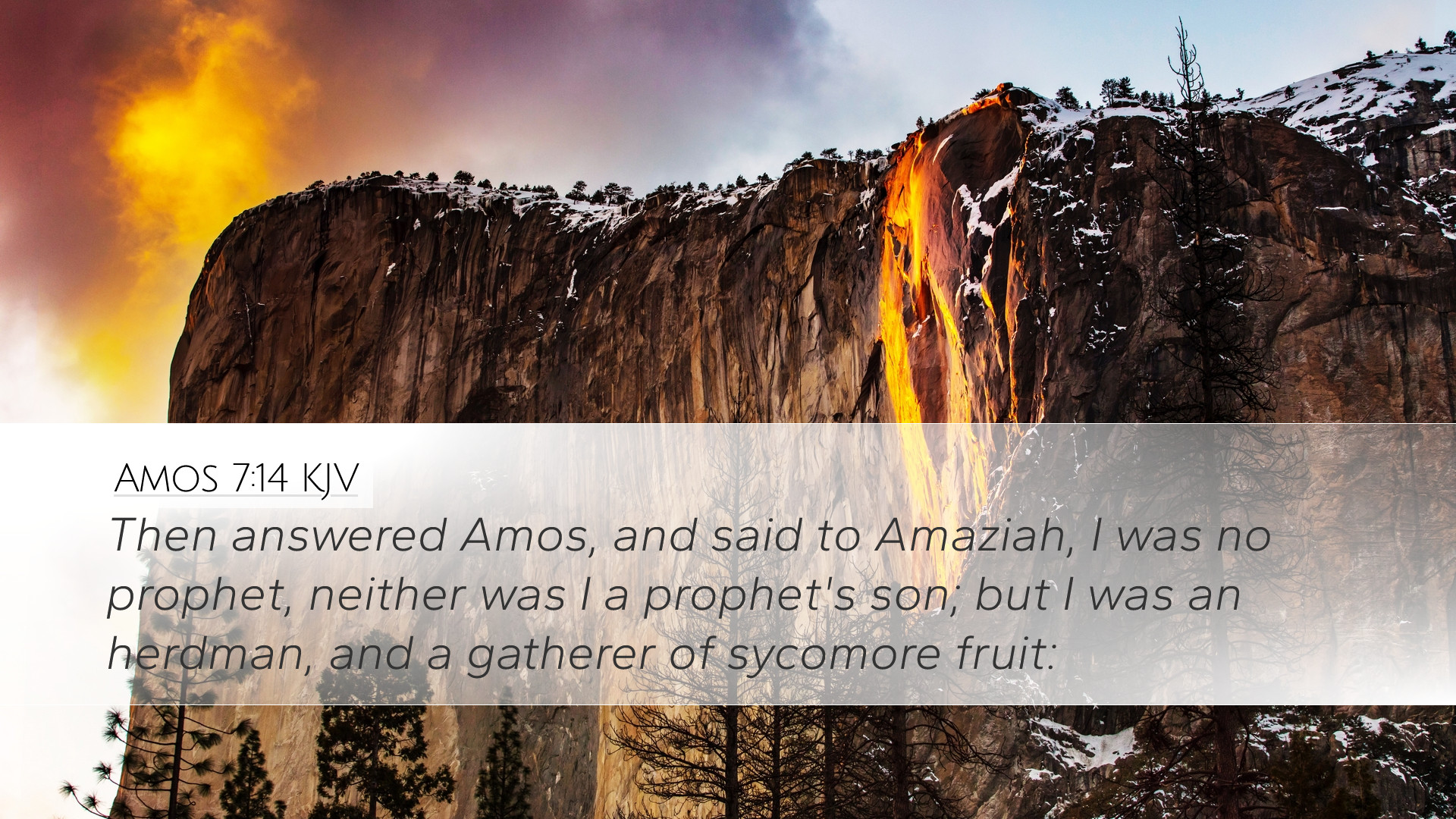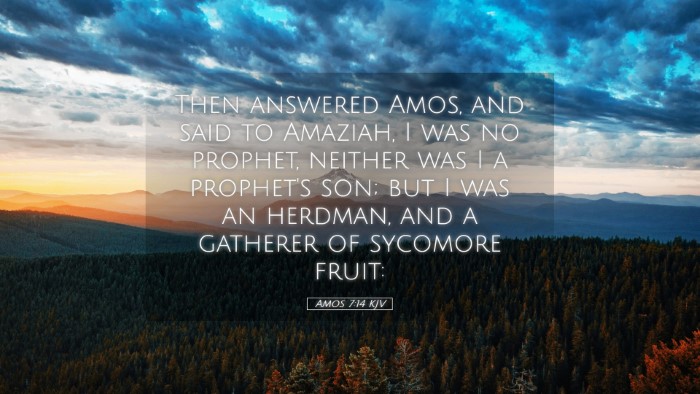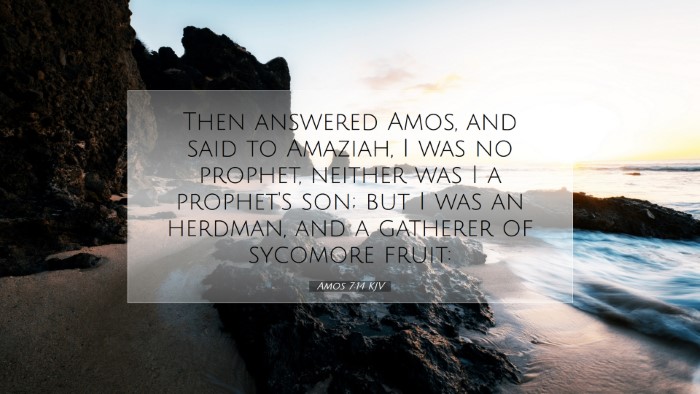Old Testament
Genesis Exodus Leviticus Numbers Deuteronomy Joshua Judges Ruth 1 Samuel 2 Samuel 1 Kings 2 Kings 1 Chronicles 2 Chronicles Ezra Nehemiah Esther Job Psalms Proverbs Ecclesiastes Song of Solomon Isaiah Jeremiah Lamentations Ezekiel Daniel Hosea Joel Amos Obadiah Jonah Micah Nahum Habakkuk Zephaniah Haggai Zechariah MalachiAmos 7:14
Amos 7:14 KJV
Then answered Amos, and said to Amaziah, I was no prophet, neither was I a prophet's son; but I was an herdman, and a gatherer of sycomore fruit:
Amos 7:14 Bible Commentary
Commentary on Amos 7:14
Amos 7:14 presents an intriguing revelation concerning the prophet's calling and divine appointment. The verse states:
"Then answered Amos, and said to Amaziah, I was no prophet, neither was I a prophet's son; but I was a herdman, and a gatherer of sycamore fruit."
Context of the Passage
To fully grasp the meaning of Amos 7:14, it is essential to explore the broader context within which Amos prophesied. The northern kingdom of Israel was in a state of moral decline and spiritual decay. Amos, a shepherd from Tekoa, was called by God during a time of prosperity that was marked by injustice and social inequity. He was sent to deliver a message of warning and judgment against the corrupt practices of the people and their leaders.
Insights from Public Domain Commentaries
Matthew Henry’s Commentary
Matthew Henry emphasizes the humble origins of Amos. He stresses that God often chooses unlikely individuals to carry out His divine purposes. This choice highlights that the effectiveness of one's ministry is not dependent on social status or prophetic lineage. By identifying himself as "a herdman" and one who gathers sycamore fruit, Amos illustrates the personal humility that typifies true prophetic authority. Henry posits that God can use the lowly to confound the wise, reflecting 1 Corinthians 1:27-29. Henry also points out that Amos's response serves as a testament to his authenticity and sincerity in his role as a prophet.
Albert Barnes’ Notes on the Bible
Albert Barnes provides a detailed analysis of Amos's statement, noting that the lack of prophetic lineage was significant in a time when prophetic authority was often derived from familial connections. This fact underlines the divine nature of Amos's calling; he was not self-appointed nor motivated by personal ambition. Barnes suggests that Amos’s occupation as a herdman and fruit gatherer showcases God's ability to call individuals from every walk of life, reinforcing the notion that God values character over credentials. This is particularly relevant for pastors and leaders who may sometimes feel inadequately prepared for their calling.
Adam Clarke’s Commentary
Adam Clarke delves into the implications of Amos's statement about his profession, viewing it as a declaration of his directness and integrity. Clarke argues that Amos's acknowledgment of his background is a reminder of the authenticity needed in ministry—leaders must be genuine and transparent about their past and how God has worked in their lives. Clarke adds that Amos faced opposition from Amaziah, the priest, who sought to dismiss Amos’s authority. This illustrates a common conflict within churches and ministries when true voices of repentance challenge the status quo. Clarke encourages those in ministry to remain steadfast in their mission despite opposition and skepticism.
Theological Implications
- God’s Sovereignty in Calling: Amos's testimony reminds us that God calls whom He wills. The Lord's choice of Amos exemplifies His sovereign authority over the affairs of men.
- Authenticity in Ministry: The recognition of one’s origins and personal journey contributes to a deeper understanding of God's grace. It affirms that ministry is less about one’s background and more about the divine message entrusted to them.
- Challenge to the Status Quo: Amos's confrontation with Amaziah serves as a reminder that true prophets often provoke discomfort and challenge those in power. This highlights the prophetic role in speaking truth to power.
Applications for Today’s Leaders
The message found in Amos 7:14 holds significant implications for modern-day church leaders:
- Embrace Your Calling: Regardless of your background, be confident in the calling God has placed on your life. Reject discouragement from others who may not understand your mission.
- Value Humility: Leaders should exhibit humility in their service, understanding that all gifts and callings come from God. Leadership is best exercised through service rather than authority.
- Preach Conviction: Just as Amos was called to deliver a difficult message, contemporary leaders must not shy away from delivering biblical truths that challenge the current cultural narrative.
Conclusion
Amos 7:14 serves as a powerful reminder of God’s ability to use ordinary individuals for extraordinary purposes. The insights derived from public domain commentaries enrich our understanding of the passage, inspiring pastors, students, theologians, and Bible scholars to embrace their unique callings and serve with integrity and humility. The enduring truth of this verse lies in its affirmation that God equips those He calls, empowering them to fulfill His divine will amidst challenges and opposition.


